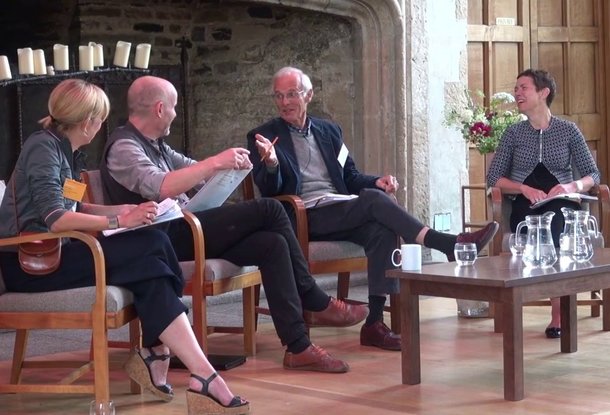Everything we make includes an element of design. But design isn’t limited to household objects, clothes or buildings, it influences whole systems that shape the way we live. The climate crisis and corrosive inequality tell us that the systems we have need a redesign, and quickly. A new collection of essays poses the critical question: Can Design Catalyse the Great Transition? published by the New Weather Institute, Schumacher College and The School of Design at Carnegie Mellon University, in association with the Dartington Hall Trust.
The concept of ‘transition’, towards a more sustainable, equitable and convivial society, is giving a new meaning to the word, with the emergence and rapid spread of networks like the Transition Towns and initiatives to visualise a ‘Great Transition’ by various groups, themselves inspired by much earlier work like Karl Polanyi’s book, The Great Transformation. And, the New Weather Institute, together with the STEPS Centre at the Institute of Development Studies and Sussex University is instigating a new, international alliance for rapid transition, launching later this year. Such contemporary projects not only share the common goal of ‘transition’ but also a consensus about what, broadly speaking, needs to be done to bring about this transition: rapid decarbonisation and the development of circular economies; decentralisation of economic and political structures; development of new kinds of systems through which everyone’s needs are met equally for food, energy, transport, monetary, health, and education, and the recovery of community and restoration of ecosystems.
The emerging practice of Transition Design belongs to this family of transition networks and groups. It is an area of design research, theory and practice that aims to catalyse systems level change, and, in the long term, to transform positively how we live.
The concept of ‘transition’, towards a more sustainable, equitable and convivial society, is giving a new meaning to the word
These essays come from the second Transition Design Symposium which was held at Dartington in June 2016. They are reflections on Transition Design at a critical point in its development from a range of disciplinary perspectives. They stretch, challenge and interrogate Transition Design, providing interesting new perspectives and opening up new space for dialogue within and across disciplines. The include one of the last pieces of writing from the late, great thinker and practioner of the new economy, Robin Murray. There are contributions too from Ingrid Mulder and Derk Loorbach of the Delft University of Technology, Ruth Potts and Julie Richardson of Schumacher College, Andrew Simms of the New Weather Institute, Sevra Davis and Tony Greenham of the RSA, Emma Dewberry from the Open University, Lucy Kimbell and Beatrice Andrews, Tom Crompton of the Common Cause Foundation, Clare Brass then of the RCA, Julie Lohmann, Dan Lockton, CMU, Lucy Neal, and Hilary Cottam.
The Symposium was itself designed to open up a conversation between design and other fields that share a mutual desire for rapid transition to a more sustainable society. This collection is hoped will take that conversation to a broader audience.
A few non-residential places are still available for the 2018 Transition Design Symposium, Transition Together taking place at Dartington Hall, on 21-23 June, 2018.
(Photo: The photograph shows, left to right, Ruth Potts, Andrew Simms, Robin Murray, Hilary Cottam)















